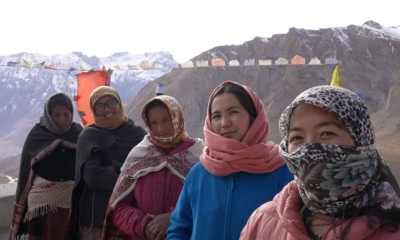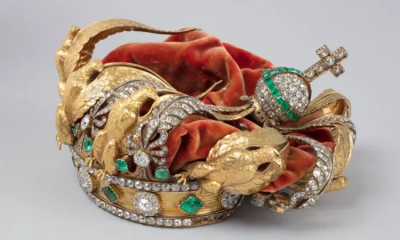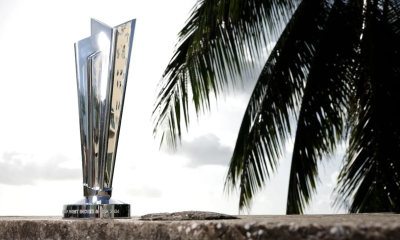News
Nadesan sought Cyprus citizenship: Pandora papers

Thirukumar Nadesan who is under investigation by the bribery commission over his alleged offshore assets paid a deposit of $1.3 million to buy Cyprus citizenship, according to the ‘Pandora Papers” leak of secret financial documents.
The investigation by the International Consortium of Investigative Journalists (ICIJ) reported that Nadesan, the husband of former deputy minister Nirupama Rajapaksa, had tried to secure Cyprus citizenship sometime after 2014.
“Citizenship-for-sale programs like Cyprus’ have been exploited by corrupt politicians and criminals to travel visa-free in the European Union and transfer money into EU countries without much scrutiny,” according to an ICIJ report.
It said the documents leaked from the Singapore-based Asiaciti company which managed much of Nadesan’s overseas wealth, did not say if his application was successful. Nadesan and Rajapaksa had declined to answer ICIC questions about their citizenship status.
However, the leaked papers listed their two adult children as holding Cyprus citizenship.
The couple had maintained that they had not done anything illegal and Nadesan on Thursday wrote president Gotabaya Rajapaksa seeking an independent investigation.
The Commission to Investigate Allegations of Bribery and Corruption (CIABOC) called in Nadesan who made a four-hour statement on Friday.
The Pandora Papers showed that Nadesan attempted to open a bank account in Dubai in 2016 for his investment company which owned a Dubai-registered asphalt firm.
Asiaciti told ICIJ that they screened some of Nadesan’s transactions for suspicious activity and checked media reports for allegations of criminal behaviour.
“The files indicate that the oversight was flawed,” the ICIJ said.
An internal inspection report suggested that the Asiaciti officer in charge of anti-money- laundering reviews didn’t provide detailed information on Nadesan’s background — which could have raised concerns about the wealth flowing out of Sri Lanka and into his offshore accounts.
Asiaciti employees were also “unable to locate” periodic records on assessments of Nadesan’s activities.
In 2018, he was known to
In early 2018, Nadesan moved an art collection worth nearly a million dollars to Switzerland from London.
The painting, by 19th-century Indian master Raja Ravi Varma, depicts the four-armed goddess clad in a red sari with gold ornaments and standing atop a lotus flower. It was one of 31 works of art, altogether worth nearly $1 million, that were being shipped to the Geneva Freeport in Switzerland.
The owner of “Goddess Lakshmi,” and the artworks in transit with it, as recorded on the packing slip, was a Samoan-registered shell company with an unremarkable name, Pacific Commodities Ltd.
But a cache of leaked documents from Asiaciti Trust indicated that the politically connected Nadesan, secretly controlled the company and thus is the true owner of the 31 pieces of art.
In 2011, their wealth was estimated at about $160 million. Some of his early income appears to have come by way of commissions involving transactions with the national airline then known as AirLanka.
Here are excerpts of the report:
Sri Lankan power couple piled up luxury homes, artworks and cash offshore as ruling family rose and rose
Secret files reveal Rajapaksa ruling family member and husband used secret companies to stash riches around the world.
By Scilla Alecci
October 4, 2021
In early 2018, workers in a London warehouse carefully loaded an oil painting of Lakshmi, the Hindu deity of wealth, onto a van bound for Switzerland.
The painting, by 19th-century Indian master Raja Ravi Varma, depicts the four-armed goddess clad in a red sari with gold ornaments and standing atop a lotus flower. It was one of 31 works of art, altogether worth nearly $1 million, that were being shipped to the Geneva Freeport in Switzerland. That vast, ultra-secure warehouse complex, larger than 20 soccer fields, stores among its many treasures what the BBC once called “the greatest art collection no one can see.”
The owner of “Goddess Lakshmi,” and the artworks in transit with it, as recorded on the packing slip, was a Samoan-registered shell company with an unremarkable name, Pacific Commodities Ltd. But a cache of leaked documents from Asiaciti Trust, a Singapore-based financial services provider, indicates that a politically connected Sri Lankan, Thirukumar Nadesan, secretly controls the company and thus is the true owner of the 31 pieces of art. His wife, Nirupama Rajapaksa, is a former member of Sri Lanka’s Parliament and a scion of the powerful Rajapaksa clan, which has dominated the Indian Ocean island nation’s politics for decades.
The confidential documents, obtained by the International Consortium of Investigative Journalists, show that as the country was ravaged by a bloody, decades-long civil war, the couple set up anonymous offshore trusts and shell companies to acquire artwork and luxury apartments and to store cash, securities and other assets in secret. They were able to amass and hide their fortune in secrecy jurisdictions with the assistance of financial services providers, lawyers and other white-collar professionals who asked few questions about the source of their wealth – even after Nadesan became a target of a well-publicized corruption investigation by Sri Lankan authorities.
As of 2017, Rajapaksa and Nadesan’s offshore holdings, which haven’t previously been made public, had a value of about $18 million, according to an ICIJ analysis of a Nadesan trust’s financial statements. The median annual income in Sri Lanka is less than $4,000.
In emails to Asiaciti, a longtime adviser of Nadesan’s put his overall wealth in 2011 at more than $160 million. ICIJ couldn’t independently verify the figure.
The records describing the financial machinations of Nadesan and Nirupama Rajapaksa are among more than 11.9 million records from Asiaciti and 13 other offshore service providers obtained by ICIJ and shared with global media partners as part of the Pandora Papers investigation. The two-year investigation found billions pouring out of impoverished and autocratic nations and into private accounts listed under the names of shell companies and trusts, often hidden from courts, creditors and law enforcement.
Among the results: Governments around the world are starved of desperately needed resources, and global wealth is concentrated into ever fewer hands. In Sri Lanka, where economists say the income gap between the poor and the rich continues to increase, lax tax regulations have been a boon for the wealthy and powerful. The rest of the country which is still recovering from the civil war, has been left with little to invest in schools, health care and other social programs.
Piyadasa Edirisuriya, a former Sri Lankan finance ministry official and now a lecturer at Australia’s Monash University, says that offshore financial services firms could stop illicit money flows by conducting due diligence on clients and monitoring their transactions. “But in international financial centers, many don’t do that,” he said. “That is why people in countries like Sri Lanka can earn money in corrupt ways and easily use these tax havens to send them overseas.”
Gotabaya Rajapaksa, left, with Mahinda Rajapaksa on the 2019 Sri Lankan presidential election campaign trail. Image: Tharaka Basnayaka/NurPhoto via Getty Images
Sri Lanka’s president is Gotabaya Rajapaksa. Nirupama Rajapaksa’s late father was his cousin. The president’s older brother, Mahinda Rajapaksa, is prime minister. Human rights groups have accused the brothers of war crimes. Former government officials have alleged that the family has amassed a multibillion-dollar fortune and hidden part of it in bank accounts in Dubai, Seychelles and St. Martin. At least eight family members and loyalists have been investigated by authorities and some have been charged with crimes including fraud, corruption and embezzlement, according to media reports.
Nirupama Rajapaksa’s husband, Nadesan, faces allegations that he secretly helped one of his in-laws, a government minister, build a posh villa with government funds.
In a 2015 affidavit, Gotabaya Rajapaksa claimed that he and some members of his family had been the targets of a “vindictive and vicious campaign.”
In response to questions from ICIJ, Nirupama Rajapaksa and Nadesan said that their “private matters are dealt with by [the couple] properly with their advisers” and did not comment on their companies and trusts.
Nadesan added that the 2016 charges against him are “spurious and politically motivated.”
Asiaciti said that the firm is “committed to the highest business standards, including ensuring that our operations fully comply with all laws and regulations.”
It did not comment on the services it provided to Nadesan and Nirupama Rajapaksa.
The leaked records show that as the conflict intensified, Nirupama Rajapaksa, now 59 years old, and her husband, Nadesan, were establishing shell companies and trusts in offshore jurisdictions. The reasons, according to a client review in the leaked files: “confidentiality and estate planning.” Other powerful elites in the region, including relatives of Indonesian and Filipino autocrats Suharto and Ferdinand Marcos, have followed the same playbook.
In 1990, Nadesan, a British-educated businessman and trustee of several Sri Lankan Hindu charities and temples, set up a trust and a shell company in the Channel Islands, British crown dependencies off the coast of France.
The company, Pacific Commodities Ltd., would collect millions of dollars, an internal document shows, advising foreign companies doing business with the Sri Lankan government. One client was Contrac GmbH, a German manufacturer that supplied airfield buses for a project involving the country’s national airline company, now SriLankan Airlines.
Contrac said the company was not able to comment on the project. The case is “31 years old and therewith far too old for our physical and data archive,” a spokesperson said..
As the civil war escalated in May 1991, Rajapaksa and Nadesan set up Rosetti Ltd., another shell company, on the Channel Island of Jersey. It would provide consulting services “mainly in relation to inward investment into Sri Lanka,” according to confidential documents.
The couple used Rosetti to buy a luxury apartment in Sydney, near Darling Harbour. They used the same shell company to buy three apartments in London, one by the Thames River that they resold a few years later for $850,000, and two worth more than $4 million that were rented out “on a commercial basis.”
The properties have not been previously linked to the couple. Buying them through the Channel Islands company virtually ensured as much. The jurisdiction allows companies incorporated there to shield their true owners from public view while paying relatively little if any taxes.
As the offshore fortune continued to grow, Nirupama Rajapaksa entered politics. In 1994, she was elected to the Sri Lankan Parliament.
Nirupama Rajapaksa got a government post, too: deputy minister of water supply and drainage.
Altogether, the Rajapaksa family controlled up to 70% of the national budget, the Al Jazeera news channel reported.
In the world of international finance, government officials like Nirupama Rajapaksa and their families are considered “politically exposed persons,” or PEPs, and are supposed to be subjected to extra scrutiny – in case, for example, they are exploiting their positions for financial gain. Financial services providers are required to alert authorities if they suspect clients are involved in illegal activity.
Asiaciti began to include Nadesan in a special register for PEP clients. After 2010, Nirupama Rajapaksa’s proper name rarely appeared in the leaked documents related to her family’s offshore holdings, and she was sometimes mentioned only as “wife of the settlor,” the files shottps://www.documentcloud.org/documents/21072241-asiaciti-review_-nadesan-trustw.
Asiaciti officers said they screened some of Nadesan’s transactions for suspicious activity and checked media reports for allegations of criminal behavior, documents show. The files indicate that the oversight was flawed. An internal inspection report suggests that the Asiaciti officer in charge of anti-money- laundering reviews didn’t provide detailed information on Nadesan’s background — which could have raised concerns about the wealth flowing out of Sri Lanka and into his offshore accounts. And Asiaciti employees were “unable to locate” periodic records on assessments of the client’s activities.
Asiaciti told ICIJ that the firm maintains a “strong” compliance program. “However, no compliance program is infallible,” it said in an emailed response.
“When an issue is identified, we take necessary steps with regard to the client engagement and make the appropriate notifications to regulatory agencies,” the firm said.
After his wife assumed her government post, Nadesan began to transfer assets to new secrecy jurisdictions. Asiaciti set up a trust for him in New Zealand in 2012 and later moved it to the Cook Islands in the South Pacific, a jurisdiction that U.S. law enforcement agencies consider “vulnerable” to money laundering, with laws that protect trust beneficiaries from court judgments.
Asiaciti also transferred Pacific Commodities from the Channel Islands to Samoa, another South Pacific island nation, which is on the European Union’s blacklist of noncooperative countries because of its “harmful preferential tax regime.”
By this point, Nadesan’s consulting company had become the owner of an art collection, which included paintings by noted Sri Lankan cubist George Keyt and by Indian artists Jamini Roy (known for combining Indian and Western styles) and Maqbool Fida Husain (known as the “Picasso of India).” By 2014, the collection would grow to include 51 pieces with an estimated total value of more than $4 million. Some of the art was stashed in a London warehouse; other works were stored in the Geneva Freeport.
The couple’s rental properties were yielding thousands of dollars in income, sometimes paid in cash. In London, agents working for Nadesan would vet prospective residential tenants. In Sydney, a contractor would check that the TV, window blinds and other accessories in the couple’s luxury apartment were working properly.
Amid the flurry of offshore activity, Nadesan bought a 16-acre plot near Colombo, which would later come under scrutiny by investigators.
In Colombo, Nadesan became chairman of a state company that owned the local Hilton hotel. He presided over galas attended by members of high society.
In 2014, as the Sri Lankan government considered legislation to allow dual citizenship, Nadesan applied for a Cyprus passport after depositing $1.3 million in a bank there, according to the confidential files. “Citizenship-for-sale” programs like Cyprus’ have been exploited by corrupt politicians and criminals to travel visa-free in the European Union and transfer money into EU countries without much scrutiny. The files don’t say if his application was successful.
As a government minister, Nirupama promoted local industry, shaking hands with Asian prime ministers and giving interviews. In one, she expounded on the difficulties faced by female politicians in a male-dominated environment.
“As women, we have better qualities than men and are more honest and are less vulnerable to bribes and corruption,” she said in a 2014 interview with a local magazine. “If we had more women running the country, it will be good.”
(After the 2015 election) Nirupama lost her deputy minister job.
A year later, she and her husband were implicated in a $1.7 million embezzlement case involving the 16-acre plot that Nadesan had acquired six years earlier.
In March 2016, financial authorities summoned the couple to give statements about the plot, upon which a villa had since been built. Prosecutors suspected that the villa actually belonged to Basil Rajapaksa, the former economic development minister, and were trying to determine whether he had used public funds to build the villa with Nadesan’s help.
In a court deposition reported by local media, the villa’s architect testified that Basil Rajapaksa’s wife had attended a groundbreaking ceremony presided over by the presidential astrologer, and that the minister’s office had approved the construction plan, which included a gym, a swimming pool and a surrounding farm.
Leaked files show that, as the investigation continued in the summer of 2016, Nadesan began preparations to open a Dubai bank account for his investment company, which owned a Dubai-registered asphalt firm.
In confidential emails to a bank officer, he introduced himself as the husband of a politician in “semi-retirement” and owner of a 60-room hotel on the eastern coast of Sri Lanka. He signed the emails “TN.”
When the bank employee requested all statements from company bank accounts in the United Arab Emirates, as well as other business records, to comply with the bank’s due diligence policy, Nadesan was alarmed. He emailed Asiaciti officers instructing them to limit the amount of information they disclosed: “WE CANNOT [yield to] EVERY WHIM @ FANCY A BANK REQUIRES WITHOUT GIVING ANY COMMITMENT THAT WE WILL BE ON BOARDED,” he wrote in all caps. “THESE ARE CONFIDENTIAL SENSITIVE INFORMATION[.] WE HAVE TO DRAW A LINE AT A POINT”
“Kindly note [that the company] is NOT going to exhibit all bank accounts it holds in the UAE . . . under any circumstances, even if an account is not going to be opened,” Nadesan told the bank in a separate email.
In October, Nadesan was arrested on embezzlement charges related to the land and the villa east of Colombo.
Just before his arrest, he wrote a personal letter found in the leaked files to the new Sri Lankan prime minister, Ranil Wickremesinghe, proclaiming his innocence. Nadesan said he wasn’t aware until he read news reports that Basil Rajapaksa had built a house on his property. Then he sold the land, he said, to avoid “harm to [his] name and reputation.”
“I request your good self to appreciate that I have not done anything improper or illegal and do justice by me,” Nadesan wrote. “My transactions are transparent and matters of records.”
Nadesan denied wrongdoing and said that the case is based on a non-credible witness. The charges “amount to a travesty of justice,” he said.
In January 2021, the new president appointed a government commission to review criminal allegations – including land deal-related embezzlement charges against Nadesan – brought by the previous government against Rajapaska allies. Over the objections of human rights advocates and other critics, the commission recommended the charges against Nadesan be dropped. The case is ongoing.
Contributors: Margot Gibbs, Echo Hui, Mario Christodoulou, Kentaro Shimizu
News
INS GHARIAL makes port call in Colombo

The Indian Naval Ship (INS) GHARIAL made a port call in Colombo for operational turnarounds on 04 Feb 26. The Sri Lanka Navy welcomed the visiting ship in compliance with naval traditions.
Commanded by Commander Gaurav Tewari, INS GHARIAL is a vessel with a length of 124.8 meters.
During this visit, ten (10) Bailey Bridges, brought by ship, through the coordination of the High Commission of India in Sri Lanka, will be handed over to the Disaster Management Center. These bridges will provide temporary transportation links while bridges damaged across the island by adverse weather conditions are repaired.
The crew’s itinerary features scheduled goodwill activities with the Sri Lanka Navy, alongside visits to several tourist attractions across the island.
News
Speaker’s personal secretary accused of interference with ongoing bribery investigation
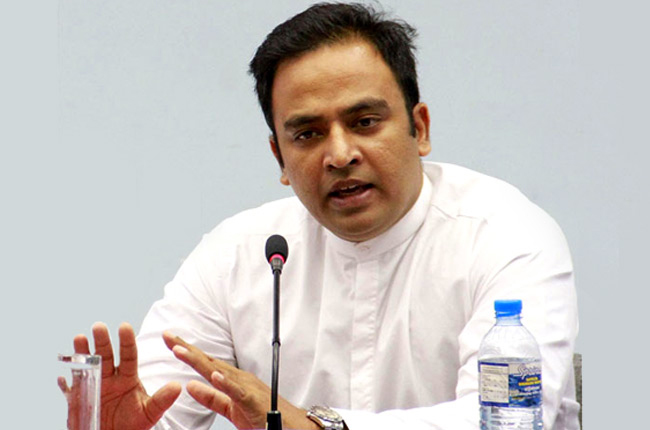
SJB Gampaha District MP Harshana Rajakaruna yesterday told Parliament that the Speaker’s Personal Secretary had written to the Secretary-General of Parliament seeking information on a complaint lodged with the Commission to Investigate Allegations of Bribery or Corruption (CIABOC) by a former Deputy Secretary of Parliament against the Speaker. Rajakaruna called for an immediate investigation into what he described as interference with an ongoing probe.
Raising the matter in the House, Rajakaruna said he had formally requested the Commission to initiate an inquiry into the conduct of the Speaker’s Personal Secretary, Chameera Gallage, questioning the authority under which such information had been sought.
Rajapakaruna tabled in Parliament a copy of the letter allegedly sent by Gallage to the Secretary-General requesting details of the bribery complaint.
Addressing the House, Rajakaruna said that the letter, sent two days earlier, had sought “full details” of the complaint against the Speaker. He maintained that seeking such information amounted to interference with an investigation and constituted a serious offence under the Bribery Act.
“The Speaker’s Secretary has no right to interfere with the work of the Bribery Commission. Under what law is he acting? What authority does he have? The Speaker, like everyone else, is subject to the law of the land,” Rajakaruna said, urging the Commission to take immediate action.
He noted that the Bribery Act treated the obstruction of investigations and the destruction of documents relating to such inquiries as serious offences punishable by law, and said he believed the Minister of Justice would concur.
The allegations sparked sharp reactions in the Chamber, as Opposition members called for accountability and due process in relation to the complaint against the Speaker.
By Saman Indrajith
News
Govt: Average power generation cost reduced from Rs. 37 to Rs. 29
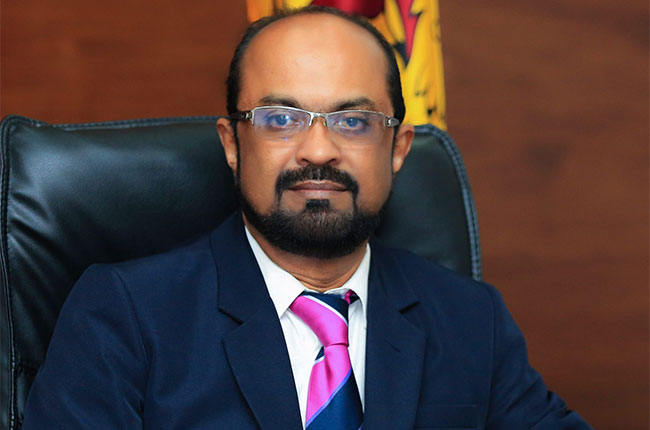
The Ceylon Electricity Board has managed to reduce the average cost of electricity generation from Rs. 37 per unit to Rs. 29, marking a 22 percent reduction, Minister of Power and Energy Eng. Kumara Jayakody told Parliament yesterday.
Responding to an oral question raised by Opposition MP Ravi Karunanayake, the Minister said that electricity tariffs cannot be reduced unless the cost of generation is brought down.
“You cannot reduce electricity tariffs without reducing the cost of generation. What we are currently doing is buying at a higher price and selling at a lower price. When we assumed office, the cost of purchasing and generating electricity was Rs. 37 per unit. We have now managed to bring it down to Rs. 29, a reduction of 22 percent.
Our target is to further reduce this to Rs. 25. Once that is achieved, we will reduce electricity tariffs by 30 percent within three years, as we promised,” Minister Jayakody said.
He added that the government has already formulated a long-term generation plan to further expand the country’s power generation capacity.
According to the Minister, key measures include increasing the absorption of renewable energy into the national grid, expanding the national transmission and distribution network, introducing renewable energy storage systems, and constructing thermal and liquefied natural gas (LNG) power plants to replace aging facilities and meet future demand.
He also said that steps would be taken to enhance the capacity of existing hydropower plants as part of the broader strategy to ensure energy security and reduce long-term electricity costs.
By Ifham Nizam
-

 Business6 days ago
Business6 days agoHayleys Mobility ushering in a new era of premium sustainable mobility
-

 Business3 days ago
Business3 days agoSLIM-Kantar People’s Awards 2026 to recognise Sri Lanka’s most trusted brands and personalities
-

 Business6 days ago
Business6 days agoAdvice Lab unveils new 13,000+ sqft office, marking major expansion in financial services BPO to Australia
-

 Business6 days ago
Business6 days agoArpico NextGen Mattress gains recognition for innovation
-

 Business5 days ago
Business5 days agoAltair issues over 100+ title deeds post ownership change
-

 Editorial6 days ago
Editorial6 days agoGovt. provoking TUs
-

 Business5 days ago
Business5 days agoSri Lanka opens first country pavilion at London exhibition
-

 Business4 days ago
Business4 days agoAll set for Global Synergy Awards 2026 at Waters Edge




